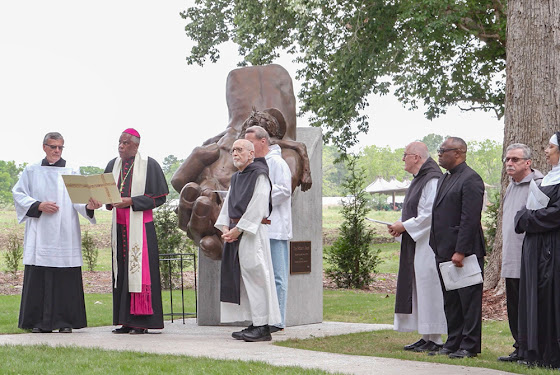Tuesday, May 27, 2025: This meditation garden is to honor the enslaved and somehow change the world by compassion
Mepkin Abbey, a Trappist monastery in rural South Carolina, has inaugurated a new meditation garden memorializing the enslaved African Americans and Indigenous who once worked the land, part of a larger effort for atonement at the 76-year-old institution.
A blessing ceremony with Bishop Jacques Fabre-Jeune of Charleston, South Carolina, took place April 26 at the property in Moncks Corner, which functioned as Mepkin Plantation under prominent British colonists beginning in the late 18th century.
"We don't have to be upset. Truth can always hurt," said Fabre-Jeune, a Haitian-born prelate who is the first Black Catholic bishop in South Carolina.
"We don't like when people tell us the truth. We feel uncomfortable. But after that experience, we know that it was good for us."
Built in the 1760s, the complex served as the home of Henry Laurens, a Founding Father who served as a president of the Second Continental Congress. His wealth came largely from his involvement in Austin and Laurens, the largest trafficking house in North America. He held some 50 African Americans in bondage at Mepkin.
The over-7,000-acre plantation, home to 300 enslaved persons over the years, was sold several times before being acquired by publishing magnate Henry Luce and his wife, the future congresswoman and conservative activist Clare Boothe Luce. She converted to Catholicism in 1946 and the couple donated much of the land to the Trappists.
Mepkin Abbey emerged shortly thereafter, with monks from the Abbey of Our Lady of Gethsemani in Kentucky, where the Trappists themselves had held enslaved people in their early history. In the decades since its founding, the establishment in South Carolina has welcomed pilgrims and tourists for prayer while also running a variety of agricultural enterprises.
The Mepkin cemetery houses the remains of the Luces and Henry Laurens, as well as Henry's son John Laurens, an abolitionist who fought in the Revolution and famously attempted to recruit enslaved men as soldiers in exchange for freedom. (The plan was shot down by the South Carolina legislature and John died in battle in 1782.)
Twenty unmarked graves, believed to house the remains of workers enslaved by Henry Laurens, were discovered adjacent to the Mepkin cemetery last year, according to Abbot Joseph Tedesco.
He helped spearhead the new Meditation Garden of Truth and Reconciliation, inspired by the landmark commission formed in South Africa following apartheid. The planning committee for the Mepkin project included South Carolina State University professors Alison Mc Letchie and Frank Martin, the Charleston Diocese's Black Catholic Ministries director Kathleen Merritt, Pastor Eleanor Cooper Brown of the International African American Museum, and Deacon Larry Deschaine, who leads the diocese's Native American ministry.
Among the new garden's features are a seven-station historical installation, a lemniscate infinity path, and Garland Weeks' life-size brass statue of a Christ figure held up by the hand of God.
"This meditation garden is to honor the enslaved and somehow change the world by compassion," Tedesco said at the blessing ceremony, which was attended by several notable figures, including U.S. Rep. Jim Clyburn, D-South Carolina.
Tedesco continued, "Their souls are calling us to be attentive to who they are and what they lived through and how we could change the future."






Comments
Post a Comment